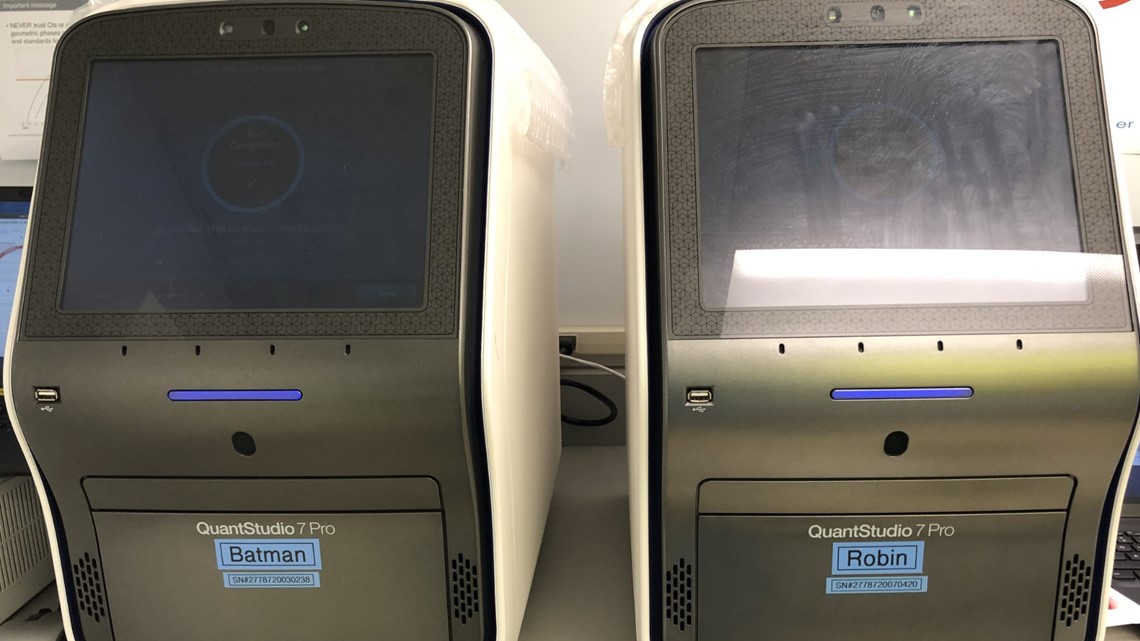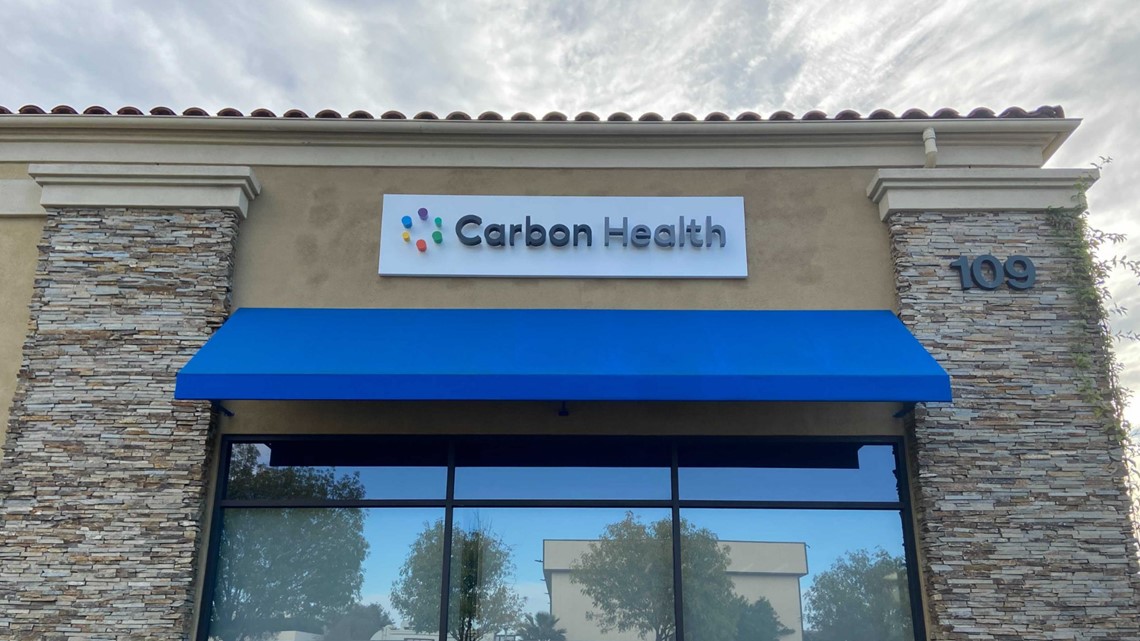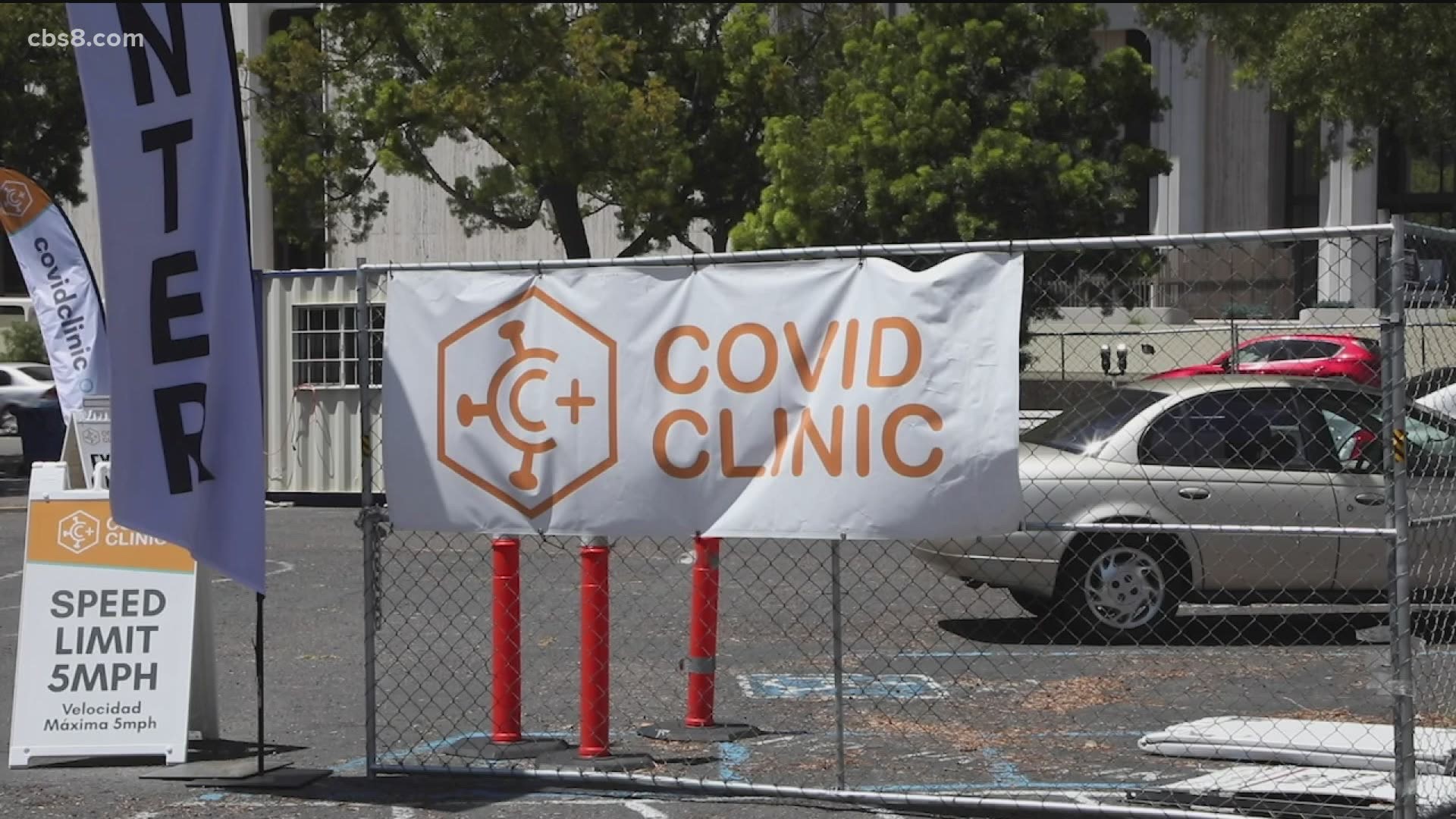SAN DIEGO COUNTY, Calif. — As a waiter who had been laid off four times during the pandemic, Carmen Lucci couldn’t afford a COVID-19 test. But he couldn’t afford to go without it, either.
The La Mesa resident was exposed to COVID-19 in October, and his employer demanded a negative test before his upcoming shift or a two-week quarantine.
Lucci spent $195 on a rapid test at Covid Clinic, a startup from Orange County that now operates in 10 states. He estimates it took him three or four days of work to earn the money back.
“They’re taking advantage of a bad situation,” Lucci said. “I feel like it should be free to do this.”
Under federal law, insurance companies are required to pay the full cost of COVID-19 tests in most cases. Yet a survey commissioned by inewsource shows many local providers are charging hundreds of dollars that consumers must pay upfront.
The survey of 50 local testing providers found almost half didn’t accept insurance in some or all cases, instead placing the burden on customers to pay upfront and then ask their insurance companies to reimburse them. It also found seven providers were charging patients for medical visits or processing fees even when the tests were covered by insurance.
The survey was conducted by Clear Health Costs, an industry leader in healthcare pricing research that interviewed employees at San Diego County testing sites in February and March.
Despite the many free and low-cost sites in the county, residents said they sometimes felt desperate enough to turn to an expensive provider. inewsource spoke with seven people who paid more than $100 for COVID-19 tests because they felt they had no affordable options. While government-run sites and local pharmacies offer free tests, they may not have appointments available on short notice or get the results back quickly enough.


Matthew Collins, Covid Clinic’s CEO, said its prices are higher than average because of the many expenses associated with starting a new business.
“We’re just trying to help,” Collins said. “We do need to charge money because this is very expensive to run, but in the end we’re just trying to help as many people as we can.”
The nonprofit recently began accepting insurance and now offers some tests for free, though its rapid PCR test could still cost customers up to $399.
Covid Clinic isn’t the only provider charging triple digit prices. At the time of the survey, six county providers typically charged customers more than $100 for a standard PCR test, 10 did for a rushed or rapid PCR test and 13 for a rapid antigen test — a less reliable option but one that offers results in minutes.
Healthcare experts said the high prices revealed by the survey might discourage people from seeking tests.
“The sticker shock and the barrier that might present to people, I think could be significant,” said Erin Fuse Brown, an associate law professor at Georgia State University who studies healthcare costs. “They may think twice about getting the COVID test, and they also may just put it off and never get one.”
Fuse Brown reviewed the survey results at inewsource’s request and was not involved in the data collection.
More than 4.7 million COVID-19 tests have been conducted in San Diego County during the pandemic, including roughly 100,000 in the past week.
But testing rates have fallen dramatically since the height of the pandemic this winter, making it more difficult for public health officials to monitor infection levels, the success of vaccination efforts and the rise of new COVID-19 variants.
“If people feel there’s a financial barrier to getting tested, then we’re just not going to ever be able to get a handle on the spread to the remaining people in the population who are not yet vaccinated,” Fuse Brown said.
Cash only clinics
Shavinder Chima tried to get tested for free, but it didn’t go as planned.
In November, he booked an appointment at a National City site run by the county. But the test was inconclusive, and Chima was running out of time.
In less than two days, he was flying to Canada to visit his family, and he would have to show immigration officials he was negative for the virus. Going back to the county clinic wasn’t an option — the results might not come back in time.
To his surprise, a rehab center in Newport Beach was operating a testing site out of a hotel near the San Diego airport. He paid $175 for rushed results and in less than a day learned he was negative.
"I was desperate," he said. "I was like, 'I haven't seen my family in almost two years.' I've been sitting at home by myself."
The testing provider, Nsight Psychology & Addiction, does not accept insurance for COVID-19 testing even though it bills insurance for treatments offered at the clinic. Chima said he didn’t ask his insurance company to reimburse him, assuming it would deny his claim.
Thirteen providers in San Diego County did not accept insurance for any of the COVID-19 tests they offered at the time of the February and March survey. Another eight only took insurance for some tests, and two others said they could “possibly” bill insurance but may require upfront payment.
The federal CARES Act doesn’t limit how much providers can charge or require them to send the bill to insurance companies if they’re out-of-network. Instead, those testing centers can choose to collect payment upfront and leave it to their customers to seek reimbursement themselves.
Fuse Brown said the law didn’t do enough to prevent expensive tests and called the high bills patients face “totally predictable.”
For decades, efforts to protect the American public from expensive medical care have been largely unsuccessful. When the Affordable Care Act was enacted, it required insurance companies to pay for out-of-network emergency care but inadvertently led to skyrocketing bills from out-of-network providers. COVID-19 testing prices have followed a similar trend.
“Anyone who’s been watching the health insurance or the healthcare industry would know that this is what would happen,” Fuse Brown said.
Several testing providers told inewsource they weren’t prepared to bill insurance when the pandemic began and thought it would be difficult to build relationships with insurance companies, leaving them no choice but to collect the payment from their customers.
Out-of-pocket antigen and PCR tests were priced at an average of $183 at the time of the survey. By comparison, Medicare — which can set lower prices — typically reimburses California providers between $35 and $52 for those tests.
“I think that the fact that there are a large proportion of these providers don't participate in any insurance at all is a problem,” Fuse Brown said.
“There’s no incentive for them to negotiate a price with an insurance company when they can charge whatever they want,” she added.
Reliable results
It was Diana Abifayker’s turn to look after her elderly parents on the West Coast and give her brother a rest. She flew from Florida to San Diego in August and got a COVID-19 test a couple days after she landed as a precaution. To her shock, the results came back positive.
The next few days were agony. She had interacted with seven family members during her stay, and the news of the positive test caused panic among her relatives. Because she had rheumatoid arthritis, Abifayker also called her doctor, who started her on vitamins to help her fight the COVID-19 infection.
But Abifayker never got sick. Neither did anyone else in her family. The test result was a false positive.
In rare cases, COVID-19 tests can incorrectly return a positive result. The U.S. Food and Drug Administration says this sometimes occurs with rapid antigen tests — the kind of test Abifayker received.
Abifayker was tested at ARCpoint Labs and paid $150. She said the lab technician didn’t explain that the rapid antigen test is less reliable than the PCR, the gold standard for COVID-19 testing. The employee told her the antigen results would come back faster, so that’s the one she chose.
“The way she said it was they were both effective and there was not much difference between them,” Abifayker said.
The Sorrento Valley lab, which offers DNA and drug testing, is a franchise that sets its own prices and operates independently from other ARCpoint sites around the U.S. It didn’t respond to requests for interviews or emailed questions.
Of the 50 providers that participated, ARCpoint was the only one that hung up the phone during the survey. The company was among the 26 providers that did not or could not answer questions about the brand, model or lab processing one or more of its tests.
“That seems to be like a critical lack of transparency in what continues to be an emergency situation,” said Daniel Larremore, a computer scientist at the University of Colorado Boulder who reviewed the survey results. Larremore has built computer models mapping the spread of COVID-19.
Test processing details can help customers looking for reliable and trustworthy options, Larremore said. For example, there are dozens of COVID-19 antigen tests and their levels of accuracy vary, so a patient may want to know in advance which brand and model of test will be used.
“It’s not just price transparency,” Larremore said. “It’s performance transparency as well.”
After her positive antigen test, Abifayker paid ARCpoint Labs another $192 for a PCR test that came back negative.
Her brother, Kareem, called the lab to explain what happened so it could be avoided in the future. The company refused to accept the possibility of a false positive result and asked his sister to pay full price for a third test, he said.
Abifayker didn’t return to the lab and she later received a $50 refund.
“It was the worst few days of our lives,” Kareem said. “We didn’t know if we got our parents sick and put them in danger. And the lab is making all this money off of people's fear and anxiety. It’s crazy.”
The wild west
When testing sites sprang up in the first few months of the pandemic, Bryan Andrus noticed that private clinics were charging unreasonably high prices.
“We did not feel that was OK,” Andrus said.
As the chief operating officer of US Specialty Labs, a San Diego clinical laboratory, he thought the company could use its expertise and equipment to provide testing at an affordable price.
The lab’s testing prices start around $40 and have dropped over time as the costs of materials have decreased. Andrus said the company can keep prices low because it processes the samples on site, while other providers operate more like middle men, collecting specimens from customers and sending them somewhere else for analysis.
Those businesses have to charge higher prices to turn a profit, Andrus said.


“It’s kind of fascinating to see the cottage industry that has grown up around this,” said Niall Brennan, the president and CEO of the Health Care Cost Institute, after looking through the many testing providers in the survey.
“It’s kind of like the wild west out there,” he added.
Brennan said customers should be on the lookout for problematic testing sites that may overcharge.
"It’s a highly opportunistic area,” he said. “People have seen the potential for making money and they’re going to try and make some money.”
Even for tech savvy consumers, it can be hard to get accurate information on COVID-19 testing.
At Equaltox, a Santa Ana clinical laboratory with multiple locations, pricing varies depending on the site, and the figures its staff reported in the Clear Health Costs survey don’t match what’s available online.
The company’s website says it accepts insurance at one Santa Ana site but not the other, and it doesn’t say whether its Escondido location takes insurance. For at least five months, the website has only listed one option in Escondido — a combined PCR and antibody test for $150. But in February, the site told surveyors it offered two tests, a PCR for $150 and a rapid antigen for $185.
The lab didn’t return phone calls or emails. Clear Health Costs said it stands by the accuracy of its data.
According to the survey, Equaltox charges customers a $75 processing fee for its PCR test in Escondido even when insurance covers the cost of the test. Its website shows a $25 fee after insurance at one of its Santa Ana sites.
Under federal law, insurance companies are required to cover processing fees and copays associated with COVID-19 tests, but it can be difficult to get reimbursed for those extra costs once they’re paid.
At least seven providers in San Diego County reported charging patients additional fees beyond what insurance covers.
“Of course these providers are going to try to push the limits,” Fuse Brown said. “They’re going to try to attach surcharges.”
Andrew Blank, a City Heights resident who estimates he has been tested for COVID-19 seven times, said understanding all the possible testing options — and avoiding unnecessary costs — can be overwhelming.


Blank has tried to rely on free government sites in most cases, but when he had plans to travel with his family to Hawaii, he needed a test that would be performed and processed within 72 hours of his flight.
In the weeks before his trip, Blank tried to plan ahead by scheduling appointments through CVS and Walgreens, which offer affordable options, but they were only booking tests a few days in advance and he didn’t want to risk waiting. After looking at the trusted providers on the Alaska Airlines website, he chose Carbon Health, where he paid $170.
Blank said he didn’t run into any problems with his test and was able to afford the cost. He thought others who don’t know how to search through the different possibilities might end up going to providers they regret.
“It sure seems like a prime time to take advantage of people who have low health literacy and don’t really know what they’re looking for,” he said.
WATCH: UC San Diego installs COVID-19 test vending machines on campus

